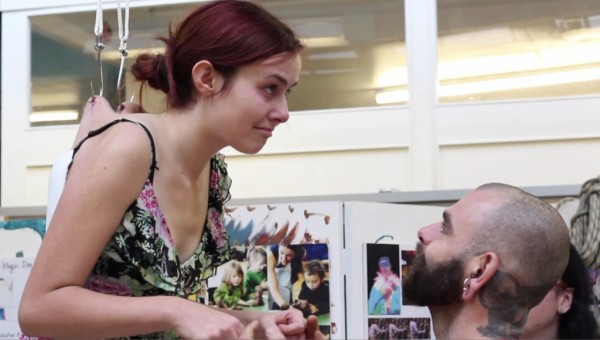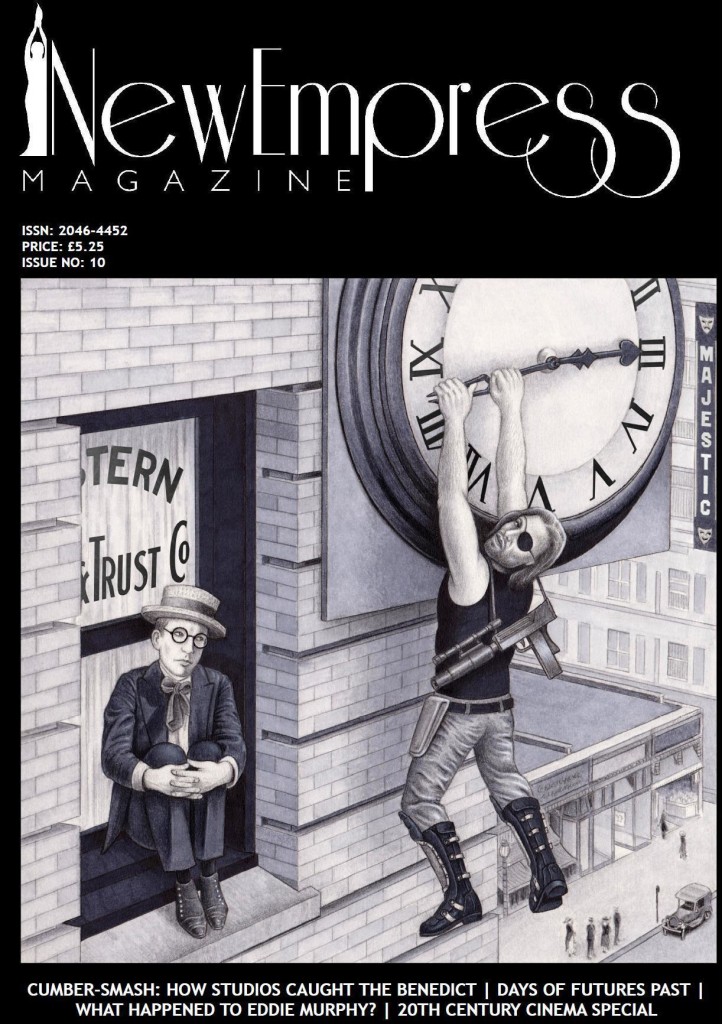
Filmmaker Kate Shenton’s documentary feature, On Tender Hooks, peers into subculture and world of body suspension and body modification. It is an intense work with a bold, non-judgemental slant. New Empress met up with the director in central London very recently to discuss her film. On Tender Hooks screens at Film4 FrightFest on Saturday 24th and Monday 26th.
New Empress: On Tender Hooks is pretty intense stuff.
Shenton: We’ve had preview screenings where people have walk out. Usually, at the beginning. It’s something I accept now. [On Tender Hooks] is not for everybody and it can be too much for people. It’s not a reflection on the quality of the film-making just … it’s a heavy subject [matter] .
The beginning really is sort of an endurance test. The guy who goes bungee-jumping with hooks in his back – that also freaked me out.
That freaks everybody out. It even freaked me out when I saw it. I was like, ‘Bloody hell, can I have that footage? Because that was amazing.’
At the start of the documentary, for me, it more the association of imagery or the shots edited together that made me really uneasy. It opens with a young lady crying – which turns out to have more meaning that first appears – and we see such things as hooks, a table, gloves, a surgical mask, lines drawn across the back – images that are quite intense, almost surgical. Were you aware of the nature of this imagery when editing the opening scenes?
Not at all. This is quite surprising, really. No. I wanted the beginning to get straight to the point and I didn’t want to beat around the bush. The beginning is very much like: “Right, this is what it is and you’re gonna get over the shock as soon as possible because we’re going to get on and watch the film”. I think that’s why the beginning is intense. It doesn’t beat around the bush and you see a lot of suspensions in a very short space of time.
How difficult was the editing process? You shot over the course of a year.
The opening was actually the hardest bit to edit. Most of it didn’t take very long. But the opening ten minutes, I was chopping and changing for about six months. It needed to get it right. [It's] a crash course in body suspension, now get over it and watch the film. And start listening to what people are saying. For me, the film is about people and not the act of suspending – more the reaction suspension has on different people that practice it.
Where did your own fascination with body suspension begin?
It all began with my best friend Damien. He’s an actor but also a freakshow magician. He does stuff like hammering nails up his nose and eating glass. I was a bit used to craziness from him. One day, when we were sitting having a couple of beers, he said, ‘Kate I’m going to do this thing called body suspension’. He showed me some stuff and I was completely freaked out and said, “Why the f**k would you want to do that? Are you completely crazy?” But after he booked his appointment, I started to get very intrigued and I asked him whether I could film his first suspension and the company – Constant Elevation – let me do it. I found it very different from the ways it had been filmed before … the short film I made went on play international festivals and I befriended the community. It snowballed, basically.
How open was the body suspension community to you as a film-maker?
People often ask ‘How did you break into such an enclosed circle’, but it was really easy, I just became friends with them. I’m quite a sociable person and I wasn’t there with an ulterior motive.
Was there any suspicion to begin with?
I think there were a couple of people that … because they didn’t know me they were naturally suspicious because people in suspension [the subculture-community] have been hurt by film-makers before. I think there was naturally for some people questions, ‘Who are you? What are you getting out of this?’ I think once I’d done my own suspension that vanished. One group would recommend me to another and then another and they would say, “Kate’s fine. Kate’s lovely. Kate’s not some evil film-maker’. It’s naturally a very friendly community.
Was there any pressure to portray them in a positive light?
I was always very honest with them and that I’d portray them in a honest light. I told them it would be objective and I think they quite liked that … the idea of being objective. I never felt any pressure.
It’s quite extreme what people do in body suspension and the instant reaction is often, ‘Oh my god, that’s gross’ and accuse them of being weird or sick in the head.
Because that’s the easiest reaction to have and that’s not the film I wanted to make. I wanted to leave it to the audience, which is how I like documentaries to be made. I don’t like documentaries where the film-maker’s voice is very strong. For me, it’s like a form of fiction, glorified fiction. I filmed events and let people say what they wanted to say.
It’s so easy to judge.
I think through this film I’ve become far less judgemental. I never used to think of myself as a judgemental person until I made this film and I started to look back and realise I probably was without realising.
Looking at people with lots of piercings and body modifications challenges our perceptions of what we can do with our bodies and challenges notions of what is beautiful and ugly.
I think in terms of modification, my definition of beauty has changed. I appreciate people who [undergo modifications] … what you have to put your body through, gosh, that’s a lot of pain to deal with. I do appreciate that as a form of beauty. Xed Le Head, the guy in the documentary, his work is some of the best in the world. It’s works of art. Saying that, I also know when somebody has got a really bad tattoo.
You also explore the different reasons and motives for those who undergo body suspension. What some of them say, I found quite surprising.
Everybody has a different reaction and a different reason for doing it. In the film, it doesn’t just follow a couple of people, I wanted to capture as many people as possible. There are some people, very much like Ben [Constant Elevation suspension team member] , who do it for “shits and giggles”. I know some people whose response is ‘It’s fun and it’s a laugh’. Then of course there are people very much into a deep emotion thing … then of course there are different suspensions for different times.
Tell me about the experience of your own suspension.
I didn’t feel like I could justify spending a year of my life filming so built on sensation and feelings without doing it myself. It’s not something I ever wanted to do, I was never naturally drawn to it, but once I’d decided to make On Tender Hooks as a film, I didn’t feel like I could justify making it without doing it myself.
I see.
It was the first bit we filmed. It did increase my understanding. It’s not something I’d do again, but it’s not something I’d take back. I gained a lot of inner strength from doing it. I don’t think you can do something like suspension and not come out of it stronger because you’re doing such an extreme thing to your body.
Kate Shenton has launched a funding campaign for her follow-up body modification documentary, Modify Me. Find out more about her campaign here : indiegogo/modifyme















